July 2016 – An Economic and Market Update
AN ECONOMIC AND MARKET UPDATE
Quarterly Market Update – July 2016
![]()
EXECUTIVE SUMMARY
- Surprise and uncertainty resulting from a series of political and cultural events taking place i.e. The Brexit, global terrorism in Nice, France and political instability in Turkey.
- We have reason for optimism for a successful United Kingdom exit of the European Union as new Prime Minister Theresa May takes over and works to stabilize the UK and bridge the gap separating competing voting blocs.
- The original Brexit – the American Declaration of Independence from England – a different but interesting look back on the economic impact.
- Reviewing an important commitment to you and our process in providing comprehensive financial advice when volatility spikes and markets swoon.
LOOKING BACK
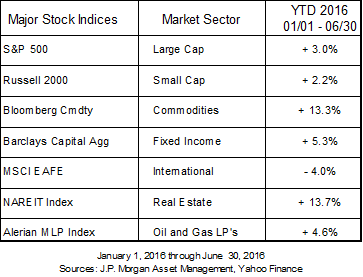
The year to date has been a demonstration of how uncertainty, fear, and non-market risks can cause market movement. The year began with a drawdown taking the S&P into correction territory on continued fears of China’s economy stagnating and the oil supply glut repercussions. These fears proved inconsequential as markets rallied significantly to close out the 1st Quarter of 2016. The 2nd Quarter took a dramatic turn with non-market risks dominating the news print in the form of a referendum of the UK to leave the European Union, racial tension, gun violence and terrorism. Tragically, as we begin the 3rd Quarter, France has now suffered another terror attack taking the lives of at least 84 people in Nice during Bastille Day festivities. In breaking news a failed coup d’etat in Turkey has increased instability in a part of the world which has already suffered so much. [i]
“BREXIT” and THE UK
Without doubt, the most significant event of the 2nd Quarter was the vote on June 23, 2016 to leave the European Union. Interestingly, much of the leadership in the UK as represented by former Prime Minister David Cameron, pushed strongly to remain in the EU. Very publicly our President stood with then Prime Minister Cameron lobbying for unity and continued membership. At the end of the day the vote to leave was cast in a high turnout election and the markets immediately signified the surprise and uncertainty of the UK’s referendum to leave the European Union.
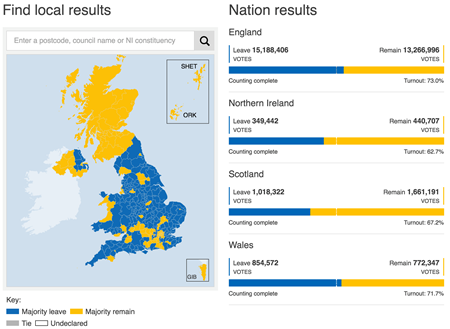
BBC News: EU Referendum Results
It is important to understand the uncertain nature of this situation. First, three important and powerful members of the UK voted to stay – Scotland, Northern Ireland, and London. Second, exiting the EU is by no means a developed protocol. By either design or lack of foresight Article 50 of the Lisbon Treaty is quite simplistic. In fact, the entirety can be read below:[i],[iii]
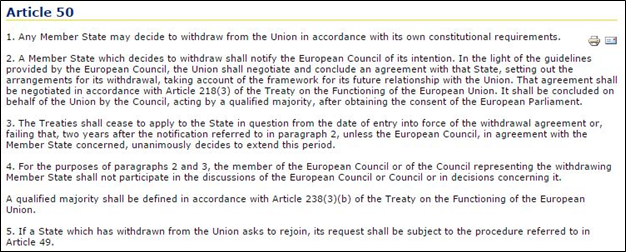
The Lisbon Treaty Article 50: www.lisbon-treaty.org
One of the most encouraging events to come out since the vote three weeks ago has been the rise of Theresa May to the position of Prime Minister. Several high profile and controversial politicians stepped out of the running allowing her to continue her rise to the top. The UK has a new Prime Minister who respects the vote of the people and yet was on record very eloquently making a case to stay in the EU shortly before the referendum vote. This development makes us more optimistic than we might otherwise be for the success of a stable departure of the United Kingdom from the European Union and in the ability of the two sides in this argument to come to terms. More on Prime Minister May’s speech later.
“First, the need for strong, proven leadership to steer us through what will be difficult and uncertain economic and political times. The need, of course, to negotiate the best deal for Britain in leaving the EU and to forge a new role for ourselves in the world. Brexit means Brexit. And we are going to make a success of it. Second, we need to unite our country. And third, we need a strong, new positive vision for the future of our country. A vision of a country that works, not for the privileged few, but that works for every one of us. Because we’re going to give people more control over their lives. And that’s how, together, we will build a better Britain.”
Theresa May – Prime Minister of England. July 11, 2016
On a lighter note, The Economist stole a line from singer-songwriter Neil Sedaka recently in a brief analysis covering the original Brexit – The Amexit – when America separated from England in 1776, “Breakin’ up is hard to do.”
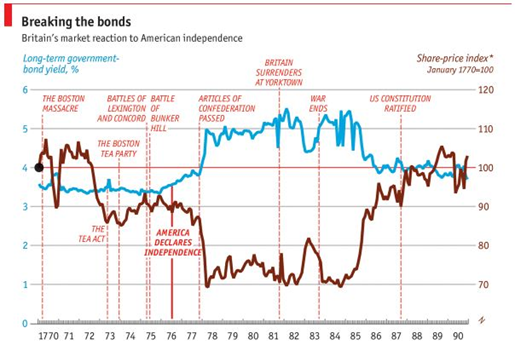
Source: FactSet, Standard & Poor’s, J.P. Morgan Asset Management, CBOE
Guide to the Markets – U.S. Data are as of June 30, 2016
CONTAGION EFFECT
The Brexit was unexpected. Consequently, markets took a downward turn against the backdrop of the surprise result. Correlation is a reality and in times of market downturns like this, the Contagion Effect magnifies correlations. Just like a cold runs through a classroom and eventually finds its way to the home, an economic shock in one region will spread and affect connected economies while the real impact to the world economy is assessed. In short order the FTSE Index fell nearly 9% followed by the Euro Stoxx 600 falling 7% and the S&P 500 losing 3.6%.
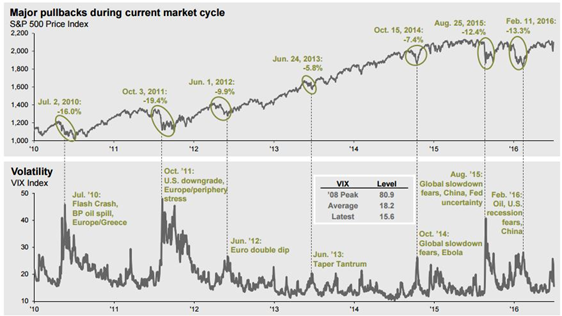
Source: FactSet, Standard & Poor’s, J.P. Morgan Asset Management, CBOE
Guide to the Markets – U.S. Data are as of June 30, 2016
Visible in the graphs above, unexpected events increase volatility very quickly with markets often turning downward. Over time the effects wear off, markets recover and volatility lessens. This happened with Brexit, it will happen again in the future, and it provides an opportunity to reflect on one of the most significant commitments we make to those who rely upon us for comprehensive financial guidance: Whenever you need money, and for whatever the reason, there will be a smart place to get it.
Our expertise is in preparing you for the certainty of uncertainty. In our commitment to the protection and growth of your portfolio we have an investment management process for accessing capital during periods of market volatility. This process includes maintaining a cash allocation to facilitate quick and easy liquidity, exposure to asset classes traditionally less volatile in times of uncertainty, and rebalancing to our risk adjusted allocation models to harvest and redistribute profits.
LOOKING FORWARD
Without doubt, we are optimistic about what the future holds. Since the Industrial Revolution, innovation has multiplied standards of living across the globe. Innovation is particularly strong in times of uncertainty. These times provide a reset, or chance to start over. We saw this occur most recently during the 2008 Great Recession and will likely see it again as the European Union works to detangle itself from the United Kingdom. Prime Minister May referenced one of our biggest concerns, inequality, in her statement about exiting the European Union, “…A vision of a country that works, not for the privileged few, but that works for every one of us.”
In a recent speech in Ottawa, Canada, President Obama addressed globalization, currently a controversial topic as it relates to distribution of economic wealth by stating, “Integration of national economies into a global economy, that’s here, that’s done.” He then used smart phones as an example of globalization providing incredible value and the interconnectivity of markets which allowed for its development and proliferation.
The ingenuity of many people working together across the globe created a device which can fit in the palm of your hand. Not only that, but it contains far more technological power than what put a man on the moon in 1969. Global innovation such as this can’t help but make you smile about what is possible when we work together. The world has a lot going on right now, just as it always has, and always does. We are optimistic of where the process of working together will take us and how we will solve the issues we face today.
We remain committed to the protection of your assets and the growth of your investment portfolio. Our focus is to protect value, provide you with trusted advice, and assist you and your family in making a lifetime of rational, informed and well-reasoned financial decisions. We thank you for your continued trust and support. Your input is always welcome and we ask that you contact us with any questions or concerns.
DISCLOSURE
All information is believed to be from reliable sources; however we make no representation as to its completeness or accuracy. All economic and performance data is historical and not indicative of future results. Market indices discussed are unmanaged. Investors cannot invest in unmanaged indices. Additional risks are associated with international investing, such as currency fluctuations, political and economic instability and differences in accounting standards.
Investing in securities in emerging markets involves special risks due to specific factors such as increased volatility, currency fluctuations and differences in auditing and other financial standards. Securities in emerging markets are volatile and can decline significantly in response to adverse issuer, political, regulatory, market, or economic developments.
An index is a statistical measure of change in an economy or a securities market. In the case of financial markets, an index is an imaginary portfolio of securities representing a particular market or a portion of it. Each index has its own calculation methodology and is usually expressed in terms of a change from a base value. Thus, the percentage change is more important than the actual numeric value. An investment cannot be made directly into an index.
Investing in fixed income securities involves credit and interest rate risk. When interest rates rise, bond prices generally fall. Investing in commodities may involve greater volatility and is not suitable for all investors. Investing in a non-diversified fund that concentrates holdings into fewer securities or industries involves greater risk than investing in a more diversified fund. The equity securities of small companies may not be traded as often as equity securities of large companies so they may be difficult or impossible to sell. Neither diversification nor asset allocation assure a profit or protect against a loss in declining markets. Past performance is not an indicator of future results.
Securities offered through 1st Global Capital Corp., Member FINRA and SIPC. Bruce Rawdin-Baron, Steven W. Pollock, Sean Storck and Nicole Albrecht are Registered Representatives of 1st Global Capital Corp. Investment advisory services, including RBFI portfolios offered through Reason Financial. IMS platform accounts offered through 1st Global Advisors, Inc. Reason Financial. and 1st Global Capital Corp. are unaffiliated entities. Reason Financial is a Registered Investment Adviser. Placing business through 1st Global Insurance Services. Registration does not imply a certain level of skill or training. We currently have individuals licensed to offer securities in the states of Arizona, California, Illinois, Indiana, Kansas, Massachusetts, Michigan, New York, Oregon and Washington. This is not an offer to sell securities in any other state or jurisdiction. CA Department of Insurance License: Bruce Rawdin-Baron #0736631, Steven W. Pollock #OE98073, Sean Storck #0F25995 and Nicole Albrecht #0F99962.
Copyright © 2016 Reason Financial all rights reserved.
Reason Financial
4747 Morena Blvd, Suite 102, San Diego, CA 92117
ENDNOTES
i. The Lisbon Treaty. http://www.lisbon-treaty.org/wcm/the-lisbon-treaty/treaty-on-European-union-and-comments/title-6-final-provisions/137-article-50.html
ii. BBC News, Referendum Election Results, http://www.bbc.com/news/politics/eu_referendum/results
iii. “Divided we Fall”, The Economist, 18 June 2016. Web. 16 July 2016 http://www.economist.com/news/leaders/21700637-vote-leave-european-union-would-diminish-both-britain-and-europe-divided-we-fall?spc=scode&spv=xm&ah=9d7f7ab945510a56fa6d37c30b6f1709
iv. The Data Team, “How ‘Amexit’ sent shockwaves through the financial markets.” The Economist. 4 July 2016. http://www.economist.com/blogs/graphicdetail/2016/07/daily-chart-0
